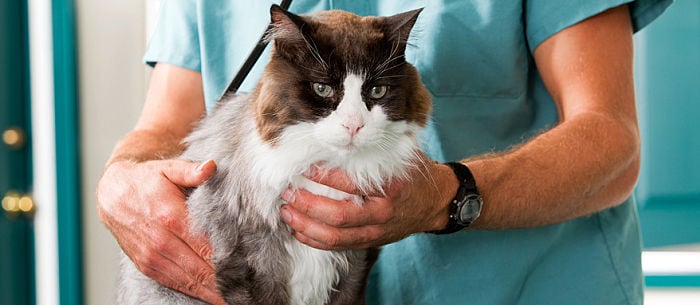Are you worried that your cat may have kidney failure? This diagnosis can be scary and overwhelming, but you can ease your anxiety by arming yourself with all the information about this disease and what you can do to help your furry friend feel like her old self. Here’s everything you need to know about kidney failure in cats.
What Are the Different Types of Kidney Failure?
Formerly categorized as acute and chronic kidney failure, veterinarians now refer to the two types of kidney failure in cats as chronic kidney disease (CKD) and acute kidney insult, says Dr. Erik Ask, a veterinarian and the owner of Cats Only Veterinary Hospital.
- Acute Kidney Insult
If your vet says your kitty has acute kidney insult, it means your cat’s kidneys have suddenly stopped working as well as they should. This kind of kidney disease may or may not be reversible, depending on what caused it and how it responds to treatment, says Dr. Ask.The outlook depends on the extent to which your cat’s kidneys have been damaged. While acute kidney disease can be reversible, it “may also lead to permanent damage to the kidneys,” says Dr. Kathleen Small, a veterinarian and the owner of Le Chat Cat Hospital. If caught early, your cat can make a full recovery.
- Chronic Kidney Disease (CKD)
If your cat is diagnosed with chronic kidney disease, it means that her “kidneys have not been functioning normally over a longer period, such as weeks, months or years,” says Dr. Laura Campbell, a veterinarian at Lambs Gap Animal Hospital. As this disease is very progressive, the prognosis is quite poor.According to Dr. Small, “any kidney changes that persist after three months are usually not reversible.” Unfortunately, if your cat is diagnosed with this type of renal failure, your vet will likely predict that he has no more than a few years left. In severe cases, diagnosed cats do not make it past several months. According to Dr. Ask, “the IRIS Staging of Feline Chronic Kidney Disease guidelines are used to help gauge and follow CKD cats.”
What Are the Causes of Renal Failure in Cats?
“Kidney disease can occur in cats at any age, though chronic disease is often the result of aging changes within the kidneys,” says Dr. Small. “Other causes of acute and chronic disease include trauma to the kidneys, toxic insult, infection, urinary tract obstruction, inherited disease (such as polycystic kidney disease), high blood pressure and cancer. Toxins to cat kidneys include lilies (Tiger, Day, Asiatic, Easter or Japanese Show), as well as antifreeze, and can potentially be deadly.”
What Are the Symptoms of Kidney Failure?
If your cat is suffering from kidney failure, you might notice that your cat is losing weight, is lethargic, seems dehydrated, and isn’t eating much. You might notice that your cat’s breath smells different (and unpleasant) and that your cat is drinking and urinating more frequently or relieving herself outside of her litter box. A cat who is suffering from kidney failure may also groom herself less frequently, leaving her with an unkempt coat.
How Can Your Vet Diagnose Kidney Failure?
If your cat is experiencing the above symptoms, you should take him to the veterinarian, who can conduct a full physical examination of your pet to see if renal failure is the root cause. According to Dr. Small, cats suffering from acute kidney disease typically have normal muscle mass and normal-sized or enlarged kidneys. “Cats with chronic disease may have severe muscle wasting, and the kidneys may be small in size, normal in size or enlarged,” she says.
After your veterinarian completes a physical examination, he will run a diagnostic panel, including blood work and urinalysis, in an effort to look for elevated creatinine and BUN levels (chemical waste products created from muscle breakdown) and a lower urine concentration. According to Dr. Small, blood pressure measurement and abdominal imaging, such as radiographs and ultrasounds, may also be used in diagnosing kidney disease.
What Are Some of the Available Treatment Options?
Here are three different treatment options that your vet may prescribe if your cat is diagnosed with kidney failure:
- Fluid Therapy
If your cat is diagnosed with acute kidney insult, he “will likely be hospitalized for a few days to receive intravenous fluids and treatments,” says Dr. Campbell. You might also need to start administering fluids subcutaneously on a continued basis at home.
- Medication
According to Dr. Small, your vet may prescribe medication to enhance your cat’s appetite, reduce his nausea and gastric ulceration, correct his electrolyte abnormalities or treat his hypertension, if applicable. If the medicines have to be administered regularly and you have an unpredictable schedule, arrange for a pet sitter to stop by to maintain a schedule for your sick cat.
- Therapeutic Diet
A therapeutic diet “consists of high-quality protein, aimed at lowering the phosphorus level in the patient,” says Dr. Small. If your cat refuses to eat her prescribed diet, as many do, Dr. Small explains that you should offer her a food that she enjoys eating, in an effort “to avoid further weight loss and muscle wasting.”
To learn more about your sick pet, read these 11 Signs It’s Time for a Trip to the Vet.
Lauren’s own cat, Chaucer, died from chronic kidney disease three years ago, after receiving gentle and thorough care from Dr. Kathleen Small in the end stages of her disease. While Lauren has not yet added another fur-baby to her family, she is the mother of a fur-less child and writes about her parenting adventures on her blog, lo-wren.
* This article is for general informational purposes only. It is not intended nor implied to be providing medical advice and is not a substitute for such advice. The reader should always consult a health care provider concerning any medical condition or treatment plan. Neither Care.com nor the author assumes any responsibility or liability with respect to use of any information contained herein.



